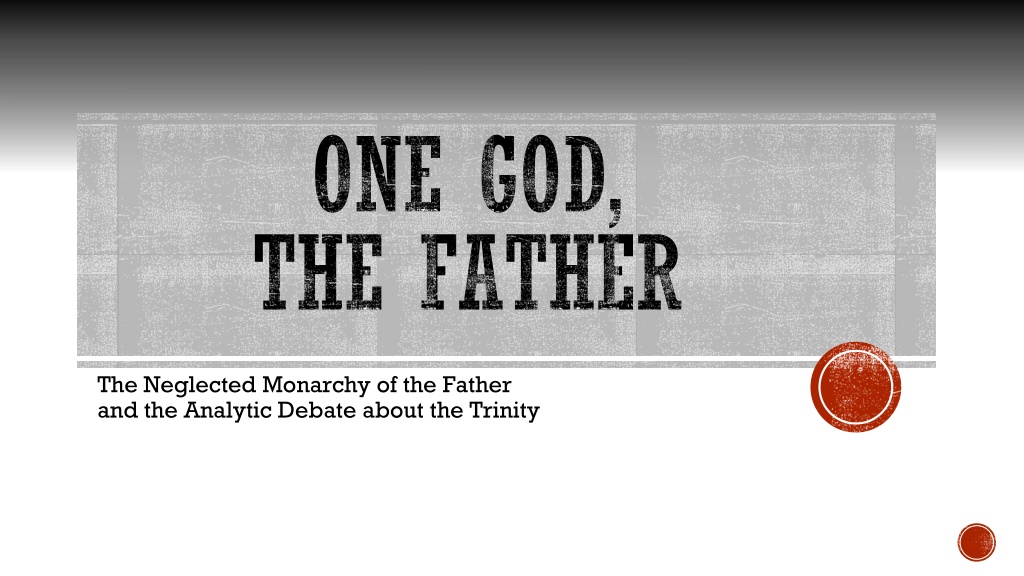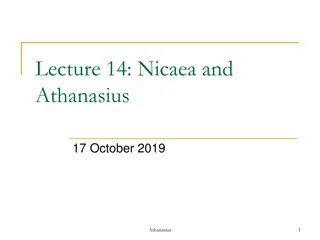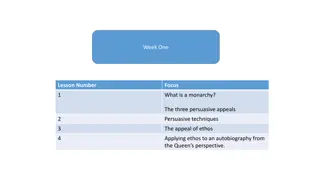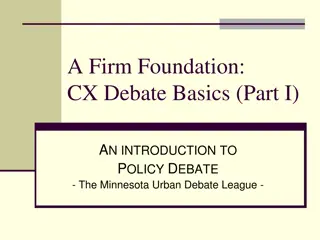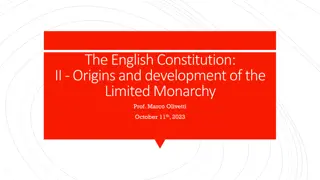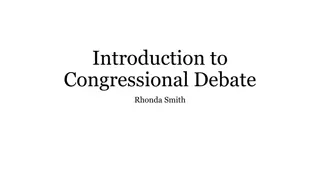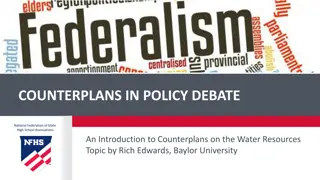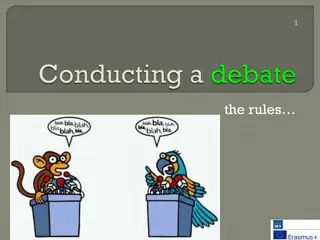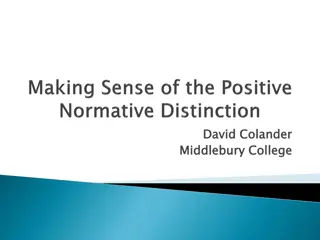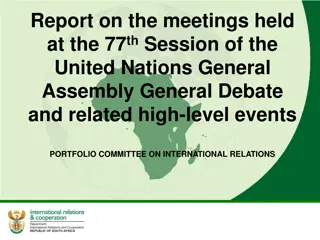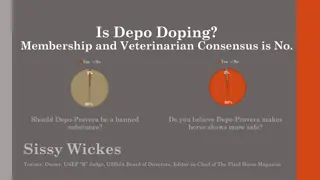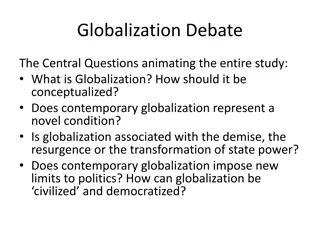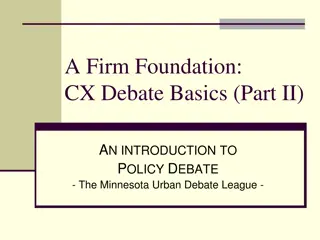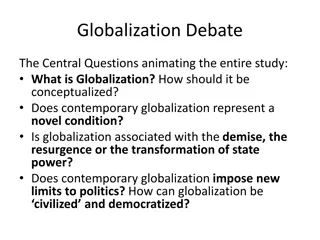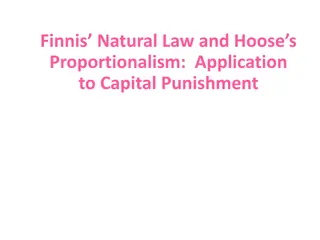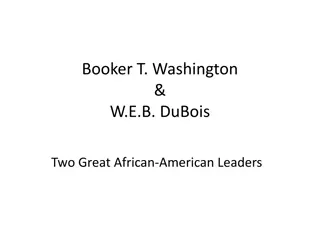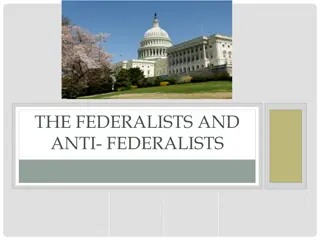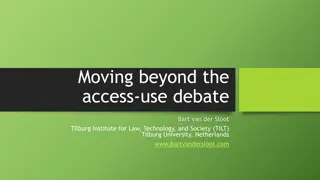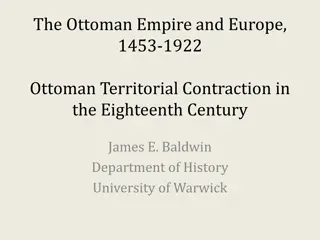Analyzing the Neglected Monarchy of the Father in Trinitarian Debate
Exploring the Monarchy of the Father doctrine and its implications on the Trinitarian debate, this analysis delves into historical context, objections, and influential alternatives like Biblical Unitarianism, shedding light on how reevaluating traditional definitions can reshape theological discussions.
Download Presentation

Please find below an Image/Link to download the presentation.
The content on the website is provided AS IS for your information and personal use only. It may not be sold, licensed, or shared on other websites without obtaining consent from the author. Download presentation by click this link. If you encounter any issues during the download, it is possible that the publisher has removed the file from their server.
E N D
Presentation Transcript
ONE GOD, THE FATHER The Neglected Monarchy of the Father and the Analytic Debate about the Trinity
GOALS (AND NOT-GOALS) 1) I DO hope to explain something about the doctrine of the so-called Monarchy of the Father. 2) I WILL NOT try to convince you it s true or even that it s a good idea. 3) I DO hope to show just how radically the landscape of a debate in philosophical theology can change when we keep one eye on history. (History matters!)
PAYOFF When we put this neglected doctrine back into view: (1) the strongest objections to trinitarianism lose their force. [ (2) the main competitor to trinitarianism requires modifications that may be fatal, but in any case will put it in a far weaker position. ]
STRONGEST OBJECTIONS TO TRINITARIANISM 1) Wonky metaphysics (or problematic equivocations) 2) Doesn t do justice to the Biblical presentation of God: A) God and the Father seem to name the same person (in NT). B) God seems to be a person (not a tri-personal being ) (OT & NT).
MOST INFLUENTIAL ALTERNATIVE: BIBLICAL UNITARIANISM (BU) Defended by Dale Tuggy, author of the SEP entry on the Trinity. Biblical Unitarianism (BU) says that: God just is the Father (as the Bible seems to say). The Son of God is Jesus Christ, a man, but not any sort of divine being. He came into existence sometime around 5 BC 1 AD. For most BU s, talk about the Holy Spirit is something like talk about God in action. Cons: Clearly not traditional (or popular). Pros: (1) Straight-forward; no wonky metaphysics; no equivocating on key terms. (2) Does justice to Biblical revelation of God as The Father and as uni-personal.
NARROWING OUR FOCUS I ll focus on two sets of definitions we might use for trinitarianism and unitarianism. My own Dale Tuggy s The doctrine of the Monarchy shows how these definitions come apart. Changes the landscape of the debate dramatically.
MY DEFINITIONS (TB) A Trinitarian Theology says that: (UB) A Unitarian Theology says that: (1) There are exactly three divine persons or individuals. Nevertheless, (1) There is exactly one divine person or individual, and (2) There is exactly one God. (2) There is exactly one God. (So, the persons can t all = the One God). (Presumably these will just be identical, or at least numerically one, but again we won t rule on that point in our definition.) (Presumably each one bears some important relation to the one God or has a claim to being called God, but our definition won t settle how that works.)
TUGGYS DEFINITIONS (TT) A trinitarian Christian theology says that (UT) A unitarian Christian theology asserts that (1) there is one God, (1) there is one God, (2) which or who in some sense contains or consists of three persons, namely, the Father, the Son, and the Holy Spirit, (2) who is numerically identical to the one Jesus called Father, (3) and is not numerically identical to anyone else (3) who are equally divine, and (4) (1)-(3) are eternally the case. (4) and (1)-(3) are eternally the case.
GOOD ENOUGH FOR GOVERNMENT WORK? Equivalent within the scope of some reasonable assumptions? Absolutely not. Starkly different when we consider things historically. Mine might be improved. Tuggy s are just inadequate. When we look at the debate through a more historical lens: *** 1) Arguments in favor of BU lose their force against certain models of the Trinity. [ 2) BU ends up in a very tight spot: A) It may just end up being incoherent, or B) It faces a trilemma that may result in (i) collapsing into Trinitarianism or (ii) losing its dialectical advantage against (all or) almost all models of the Trinity. ]
WHAT IS THE MONARCHY ? (HINT: NOT THIS!)
THE MONARCHY () = + One source A single First Principle of everything The Father is the One Source or First Principle not only of creation, but within the Trinity itself. This in turn can be disambiguated in a number of ways
WHAT DOES IT MEAN? (1) the Father is the sole source / cause of the Son and Spirit. (2) The Father is (also) somehow the source of the divine nature itself. (3) The Father is the union or the principle of unity within the Trinity (not, say, the divine nature, or the community of persons) (Probably, at a minimum, what the Greek Fathers mean.) (Something like, end of explanation for unity.) (4) Strictly speaking, the Father just is the One God. (The Son and Spirit share the same nature, but are not identical to Him.)
SOME DEFINITIONS Strong monarchy view : The proposition that The One God = the Father. Monarchical model : Model of the Trinity with a strong monarchy view. Egalitarian or symmetrical model: Model in which the persons have an equal claim to being called God (in any sense). Any quality or relation that would be relevant to whether that person can be called God (in any sense) is shared by the other two persons equally. Monarchical models are all non-symmetrical, but there could be non-symmetrical models that are not monarchical.
OUR DEFINITIONS ARE NOT EQUIVALENT In monarchical models, there are exactly three divine persons, and exactly one God, because the one God is just one of the divine persons. These count as Trinitarian on TB, and not as Unitarian on UB. (Because there are exactly three divine persons; not exactly one). But they count as Unitarian on UT. (Because the relation between the one God and the Father is identity.) Question: Do some monarchical models also count as Trinitarian on TT? (We ll return to this when we discuss consistency with mainstream analytic models.)
TWO MILLION DOLLAR QUESTIONS 1. Is this really Trinitarian? (Maybe it s Subordinationism Subordinationism! ) 2. Wouldn t this rule out almost every analytic model of the Trinity? (which are all symmetrical). No way to fully do justice to (1) in a short time, but I ll give reasons to say yes (in any sense important to actual Trinitarians.) Then I ll explain how a strong monarchy view is consistent with a much wider range of analytic models than one might expect.
MODERN EASTERN ORTHODOX THEOLOGIANS ON THE MONARCHY
JOHN ZIZIOULAS (METROPOLITAN OF PERGAMUM) Among the Greek Fathers the unity of God, the one God, and the ontological principle or cause of the being and life of God does not consist in the one substance of God but in the hypostasis, that is, the person of the Father. The one God is not the one substance but the Father (Being as Communion, pp. 40 1) The one God is the Father. Substance is something common to all three persons of the Trinity, but it is not ontologically primary until Augustine makes it so. ( On Being Persons: Towards an Ontology of Personhood , in Persons Divine and Human, ed. Christoph Schwo bel and Colin Gunton, p. 40.)
FR. JOHN BEHR (DEAN, ST. VLADIMIR S SEMINARY) The one God confessed by Christians in the first article of the creeds of Nicaea and Constantinople is unambiguously the Father. Calling upon God as Father: Augustine and the Legacy of Nicaea, in Orthodox Readings of Augustine, p. 162
FR. JOHN BEHR (DEAN, ST. VLADIMIR S SEMINARY) So how can Christians believe in and worship the Father, the Son and the Holy Spirit, and yet claim that there is only one God, not three? How can one reconcile monotheism with trinitarian faith? The Father alone is the one true God. This keeps to the structure of the New Testament language about God, where with only a few exceptions, the world God (theos) with an article (and so being used, in Greek, as a proper noun) is only applied to the one whom Jesus calls Father, the God spoken of in the scriptures This same fact is preserved in all ancient creeds, which begin: I believe in one God, the Father Such, then, is how the Greek Fathers, following Scripture, maintained that there is but one God, whose Son and Spirit are equally God, in a unity of essence and of existence, without compromising the uniqueness of the one true God The Living Pulpit (April-June, 1999), pp. 22-23
FR. JOHN BEHR (DEAN, ST. VLADIMIR S SEMINARY) For the Christian faith there is, unequivocally, but one God, and that is the Father: There is one God and Father. For Basil, the one God is not the one divine substance, or a notion of divinity which is ascribed to each person of the Trinity, nor is it some kind of unity or communion in which they all exist; the one God is the Father. But this monarchy of the Father does not undermine the confession of the true divinity of the Son and the Spirit. Jesus Christ is certainly true God of true God, as the Nicene Creed puts it, but he is such as the Son of God, the God who is thus the Father. If the term God (theos) is used of Jesus Christ, not only as a predicate, but also as a proper noun with an article, this is only done on the prior confession of him as Son of God, and so as other than the one God of whom he is the Son; it is necessary to bear in mind this order of Christian theology, lest it collapse in confusion. The Nicene Faith II: pp. 307-308
FR. THOMAS HOPKO (FORMER DEAN, ST. VLADIMIR S SEMINARY) Now in the Bible, in the creeds, and in the liturgy, it s very important, really critically important, to note, and to affirm, and to remember, that the one God, in Whom we believe, strictly speaking, is not the Holy Trinity. The One God is God the Father. That in the Bible, the One God is the Father of Jesus Christ. He is God Who sends His only-begotten Son into the world. And Jesus Christ is the Son of God. And then, of course, in a parallel manner, the Spirit, the Holy Spirit is the Spirit of God. http://www.ancientfaith.com/podcasts/hopko/the_holy_trinity (12:37 to 13:25)
FR. THOMAS HOPKO (FORMER DEAN, ST. VLADIMIR S SEMINARY) On the other hand, there is another terrible error, and the other terrible error, usually called Modalism in technical theological terminology, is where people say there is one God Who is the Holy Trinity, There is He Who Is the Trinity. And we Orthodox Christians, following scripture, and the creedal statements, and the liturgical prayers, can never say there is one God who is the Trinity. There is one God who is the Father. And this one God who is the Father has with Him eternally, Whom He begets timelessly before all ages, His only-begotten Son who is also His Logos, his Word, and also his Chokhmah, His Sophia, His Wisdom, also His Eikona, His Ikon, His Image but this Wisdom and Word and Image and Ikon, is divine with the same divinity as God, the One True and Living God http://www.ancientfaith.com/podcasts/hopko/the_holy_trinity (15:41 to 16:37)
SURPRISED? DONT BE (Ever Heard of the Great Schism?)
VLADIMIR LOSSKY ON THE FILIOQUE The Greek Fathers always maintained that the principle of unity in the Trinity is the person of the Father This is why the East has always opposed the formula of filioque which seems to impair the monarchy of the Father: either one is forced to destroy the unity by acknowledging two principles of Godhead, or one must ground the unity primarily on the common nature The Mystical Theology of the Eastern Church, p. 58
ST. PHOTIOS THE GREAT, ON THE MYSTAGOGY OF THE HOLY SPIRIT . , , ; ; ; 11. Leaving aside the aforementioned, if one admits of two causes in the thearchic and superessential Triad, where then is the much hymned and God- befitting majesty of the monarchy? Will not the godlessness of polytheism be riotously introduced? Under the guise of Christianity, will not the superstition of Greek error reassert itself among those who dare to say such things?
ST. PHOTIOS THE GREAT, ON THE MYSTAGOGY OF THE HOLY SPIRIT 12. Again, if two causes are imposed upon the the monarchic Triad, then according to the same reasoning, why should not a third one emerge? For once the principle without principle and above principle, is cast down from its throne by these impious ones and is cleaved into a duality, the principle will proceed more vehemently to be severed into a trinity, since in the supersubstantial inseparable, and simple nature of the divinity, the triad is more manifest than the dyad, and indeed also harmonizes with the idiomata. . , ; , , , .
PONTIFICAL COUNCIL FOR PROMOTING CHRISTIAN UNITY The Greek Fathers and the whole Christian Orient speak of the Father's Monarchy, and the Western tradition, following St. Augustine, also confesses that the Holy Spirit takes his origin from the Father principaliter, that is, as principle (De Trinitate XV, 25, 47, P.L. 42, 1094-1095). In this sense, therefore, the two traditions recognize that the monarchy of the Father implies that the Father is the sole Trinitarian Cause (Aitia) or Principle (Principium) of the Son and the Holy Spirit. the term ekporeusis as distinct from the term "proceed" (proienai), can only characterize a relationship of origin to the principle without principle of the Trinity: the Father. That is why the Orthodox Orient has always refused the formula to ek tou Patros kai tou Uiou ekporeuomenon and the Catholic Church has refused the addition kai tou Uiou [and the Son] to the formula ek to [sic] Patros ekporeumenon in the Greek text of the Nicene-Constantinopolitan Symbol, even in its liturgical use by Latins.
PONTIFICAL COUNCIL FOR PROMOTING CHRISTIAN UNITY The doctrine of the Filioque must be understood and presented by the Catholic Church in such a way that it cannot appear to contradict the Monarchy of the Father nor the fact that he is the sole origin (arche, aitia) of the ekporeusis of the Spirit its purpose was to stress the fact that the Holy Spirit is of the same divine nature as the Son, without calling in question the one Monarchy of the Father. https://www.catholicculture.org/culture/library/view.cfm?id=1176
PATRISTICS SCHOLARS ON SUBORDINATIONISM
MICHEL RENE BARNES subordinationism has become a scare word like Nestorian or Neoplatonist (or Papist ), and considerable nuance has to be used making it, for those of us in the business a word we have been trying to avoid and replace. In any case, orthodox Trinitarian theology, pre and post Nicene, has always had some kind of subordinationism whatever that word means to it. Read Augustine, de Trinitate I-IV (or at least I&IV) and the discussion of missio . http://www.patheos.com/blogs/euangelion/2016/06/patristics-scholar-michel-r- barnes-weighs-in-on-the-intra-complementarian-debate-on-the- trinity/#BGXyF5pLCs0IMyRm.99
LEWIS AYRES there are not only two alternatives: The Trinitarian persons are equal or eternal subordination. It is much more interesting than that. http://www.patheos.com/blogs/euangelion/2016/06/patristics-scholar-lewis- ayres-weighs-in-on-the-intra-complementarian-debate/#JKTWZPcOO54xKMrd.99
PATRISTIC SOURCES ON THE MONARCHY
GREGORY OF NYSSA, AD PETRUM , . , . , . the Holy Spirit has this note of His peculiarity according to hypostasis, being known after the Son and together with the Son, and having subsistence from the Father. The Son, who through Himself and with Himself reveals the Spirit proceeding from the Father, who alone shines forth only-begotten-ly from the unbegotten light is known by these mentioned signs. And God over all alone has a certain singular mark of His own hypostasis: being the Father, and hypostasizing from no cause, and by this sign again He is also individually recognized.
GREGORY OF NYSSA, AD PETRUM , . , . , . the Holy Spirit has this note of His peculiarity according to hypostasis, being known after the Son and together with the Son, and having subsistence from the Father. The Son, who through Himself and with Himself reveals the Spirit proceeding from the Father, who alone shines forth only-begotten-ly from the unbegotten light is known by these mentioned signs. And God over all alone has a certain singular mark of His own hypostasis: being the Father, and hypostasizing from no cause, and by this sign again He is also individually recognized.
GREGORY OF NYSSA, AD PETRUM , . , . , . the Holy Spirit has this note of His peculiarity according to hypostasis, being known after the Son and together with the Son, and having subsistence from the Father. The Son, who through Himself and with Himself reveals the Spirit proceeding from the Father, who alone shines forth only-begotten-ly from the unbegotten light is known by these mentioned signs. And God over all alone has a certain singular mark of His own hypostasis: being the Father, and hypostasizing from no cause, and by this sign again He is also individually recognized.
GREGORY OF NYSSA, AD PETRUM , . , . , . the Holy Spirit has this note of His peculiarity according to hypostasis, being known after the Son and together with the Son, and having subsistence from the Father. The Son, who through Himself and with Himself reveals the Spirit proceeding from the Father, who alone shines forth only-begotten-ly from the unbegotten light is known by these mentioned signs. And God over all alone has a certain singular mark of His own hypostasis: being the Father, and hypostasizing from no cause, and by this sign again He is also individually recognized.
GREGORY OF NYSSA, AD PETRUM , . , . , . the Holy Spirit has this note of His peculiarity according to hypostasis, being known after the Son and together with the Son, and having subsistence from the Father. The Son, who through Himself and with Himself reveals the Spirit proceeding from the Father, who alone shines forth only-begotten-ly from the unbegotten light is known by these mentioned signs. And God over all alone has a certain singular mark of His own hypostasis: being the Father, and hypostasizing from no cause, and by this sign again He is also individually recognized.
GREGORY OF NYSSA, AD PETRUM , . , . , . the Holy Spirit has this note of His peculiarity according to hypostasis, being known after the Son and together with the Son, and having subsistence from the Father. The Son, who through Himself and with Himself reveals the Spirit proceeding from the Father, who alone shines forth only-begotten-ly from the unbegotten light is known by these mentioned signs. And God over all alone has a certain singular mark of His own hypostasis: being the Father, and hypostasizing from no cause, and by this sign again He is also individually recognized.
GREGORY OF NYSSA, AD PETRUM , . , . , . the Holy Spirit has this note of His peculiarity according to hypostasis, being known after the Son and together with the Son, and having subsistence from the Father. The Son, who through Himself and with Himself reveals the Spirit proceeding from the Father, who alone shines forth only-begotten-ly from the unbegotten light is known by these mentioned signs. And God over all alone has a certain singular mark of His own hypostasis: being the Father, and hypostasizing from no cause, and by this sign again He is also individually recognized.
FR. JOHN BEHR (DEAN, ST. VLADIMIR S SEMINARY) Gregory does not identify God as that which is common, a genus to which various particular beings belong. Rather, Gregory stands clearly within the monarchical approach of Athanasius, Basil, and Gregory of Nazianzus. It is the God overall who is known specifically as Father The Nicene Faith II: p. 420
GREGORY OF NYSSA, CONTRA EUNOMIUS II.5 But let us examine the words that follow [in the creed composed by Eunomius]: He is always and absolutely one, remaining uniformly and unchangeably the only God. If he is speaking about the Father, we agree with him,
GREGORY OF NYSSA, CONTRA EUNOMIUS II.5 But let us examine the words that follow [in the creed composed by Eunomius]: He is always and absolutely one, remaining uniformly and unchangeably the only God. If he is speaking about the Father, we agree with him, for the Father is most truly one, alone and always absolutely uniform and unchangeable, never at any time present or future ceasing to be what He is. If then such an assertion as this has regard to the Father, let him not contend with the doctrine of godliness, inasmuch as on this point he is in harmony with the Church. For he who confesses that the Father is always and unchangeably the same, being the one and only God, holds fast the word of godliness,
GREGORY OF NYSSA, CONTRA EUNOMIUS II.5 But let us examine the words that follow [in the creed composed by Eunomius]: He is always and absolutely one, remaining uniformly and unchangeably the only God. If he is speaking about the Father, we agree with him, for the Father is most truly one, alone and always absolutely uniform and unchangeable, never at any time present or future ceasing to be what He is. If then such an assertion as this has regard to the Father, let him not contend with the doctrine of godliness, inasmuch as on this point he is in harmony with the Church. For he who confesses that the Father is always and unchangeably the same, being the one and only God, holds fast the word of godliness, if in the Father he sees the Son, without Whom the Father neither is nor is named. But if he is inventing some other God, besides the Father, let him argue alongside the Jews, or alongside those who are called Hypsistians, [ Most-High-ists ] between whom and the Christians there is this difference: That they acknowledge that there is a God (Whom they term the Most High or the Almighty. ) But they do not admit that He is a Father. While a Christian if he believe not in the Father is no Christian at all.
THE DEPOSITION OF ARIUS, SECTION 2 (Alexander, Pope of Alexandria, Egypt, in a council of presbyters, including 17 priests and 24 deacons of Alexandria; and 19 priests and 20 deacons of the Mareotis. So, 80 total.) [Arius and 5 other priests, their 6 deacons, and 2 bishops are named, then ] [T]he novelties they have invented and put forth contrary to the Scriptures are these following: That God was not always a Father, but there was a time when God was not a Father.
WHATS THE LOGIC HERE? 1. God is a necessary ( / eternal) being (exists at all times in all possible worlds). 2. It s analytic (thus, necessarily / eternally true) that: If any X counts as a Father, then there is a (distinct) Y such that Y is the Son (Offspring) of X. 3. So, if Father-hood is essential to God, then it s necessarily ( / eternally) true that there is a Son. 4. Fatherhood is essential to God. (Though Eunomius wants to deny this!) So 5. The Son is also a necessary ( / eternal) being (exists at all times & all worlds.)
WHATS THE LOGIC HERE? 6. Add: Creatures are (all) contingent and non-eternal. (So if X is a creature, there are worlds and times where X does not exist.) 7. So, the Son of God is not a creature. 8. Add: if X is not divine, X is created. 9. So (by modus Tollens), the Son of God is divine. Difficult to deny auxiliary premises. Looks like the only way to consistently maintain Arianism (OR BU!) is actually to deny that God is essentially or even just eternally, a Father.
TUGGYS DEFINITIONS (TT) A trinitarian Christian theology says that (UT) A unitarian Christian theology asserts that (1) there is one God, (1) there is one God, (2) which or who in some sense contains or consists of three persons, namely, the Father, the Son, and the Holy Spirit, (2) who is numerically identical to the one Jesus called Father, (3) and is not numerically identical to anyone else (3) who are equally divine, and (4) (1)-(3) are eternally the case. (4) and (1)-(3) are eternally the case.
TUGGYS DEFINITIONS (TT) A trinitarian Christian theology says that (UT) A unitarian Christian theology asserts that (1) there is one God, (1) there is one God, (2) which or who in some sense contains or consists of three persons, namely, the Father, the Son, and the Holy Spirit, (2) who is numerically identical to the one Jesus called Father, (3) and is not numerically identical to anyone else (3) who are equally divine, and (4) (1)-(3) are eternally the case. (4) and (1)-(3) are eternally the case.
TUGGYS DEFINITIONS (TT) A trinitarian Christian theology says that (UT) A unitarian Christian theology asserts that (1) there is one God, (1) there is one God, (2) which or who in some sense contains or consists of three persons, namely, the Father, the Son, and the Holy Spirit, (2) who is numerically identical to the one Jesus called Father, (3) and is not numerically identical to anyone else (3) who are equally divine, and (4) (1)-(3) are eternally the case. (4) and (1)-(3) are eternally the case. Arguably, this actually requires Monarchical Trinitarianism
ST. HILLARY OF POITIER, DE TRINITATE 12.32 For either He was not always a Father (unless there was always also a Son); or if He was always a Father, there was always also a Son; since whatever period of time is denied to the Son, to make His sonship non-eternal, just so much the Father lacks of having been always a Father: so that although He was always God, nevertheless He cannot have been also a Father for the same infinity during which He is God.
